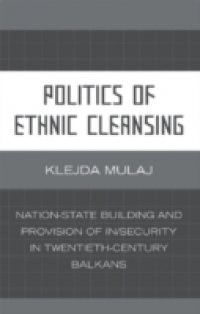This book sheds light on the causes and consequences of ethnic cleansing in the twentieth century Balkans with particular reference to the former Yugoslavia in the 1990s. In providing a thorough and consistent analysis of large-scale episodes of ethnic cleansing in modern Balkan history,Politics of Ethnic Cleansing fills an important gap in existing conflict and peace studies literature. Offering a top-down interpretation of the expulsion of ethno-national minorities as a means of state-building, the analysis rests on a fresh, multidimensional approach, which provides an eclectic discussion of nationalism, politics, and security. This book establishes an agenda for policy-making and future research by making specific proposalsfor clearing up the present ambiguities in international humanitarian law related to ethnic cleansing, rethinking humanitarian intervention with a view to restoring the long-term viability of the target states, and repudiating the argument for forced homogenization as a conflict resolution strategy.

